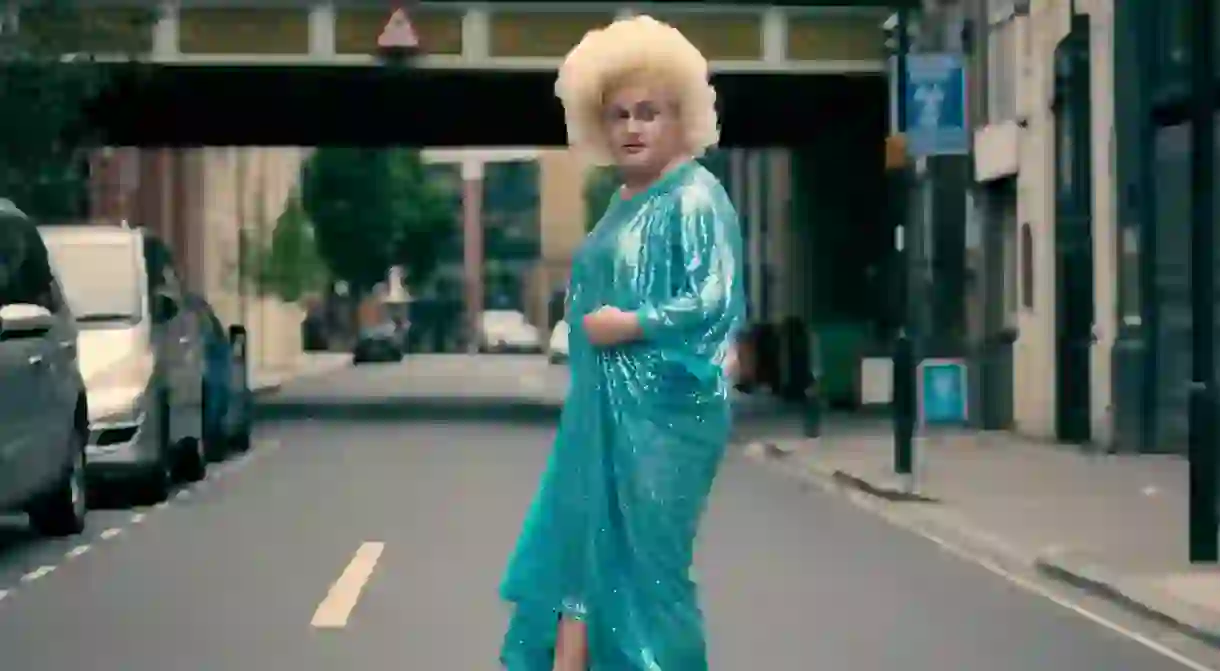Drag Queen Wayne Allingham’s Accessible Guide to London Nightlife

With his show, Disabled, Queer and Here, Wayne Allingham is breaking new ground for disabled performers in the LGBTQ community. Here, he talks about what still needs to be done, and gives his tips for an accessible night out in London.
The Culture of Pride celebrates the 50th anniversary of the Stonewall Riots.

When he was 18, Wayne Allingham was pulled up on stage by Miss Ross, a drag queen, who asked him: “Why don’t you do this for a job?” For more than a quarter of a century since, he’s been doing just that. Allingham, AKA Sugar Cube, who was born with hemiparesis (right-side muscle weakness), has found drag therapeutic, and he’s working hard to make the London drag scene more inclusive of performers with disabilities.
“There should be more disabled people on the gay circuit, and there should be more disability performers on the gay scene. Going to see the same people every time, every week or every month – doesn’t that get boring?” Allingham says. He’s been running his own night, Disabled, Queer and Here, for a year and a half. “I got in contact with the Royal Vauxhall Tavern and asked if we could put on a night for disabled people to come and have a night out and enjoy themselves. And they jumped at the chance – near enough bit my arm off,” he says.

The show is still going strong in Vauxhall, and Allingham now also performs it at the Two Brewers in Clapham, another fully accessible venue. “It’s nice to have two venues. I’d like more to come on board; to say, ‘Yes, we’d like you to have a night here for disabled people’; to be inclusive in the LGBT community, because we’re all human. At the end of the day, we’ve all got to have fun,” he says.
Improving London’s nightlife for people with disabilities doesn’t just mean working to make venues more accepting, it means looking at the practical issues in the way of them having a good night out. Allingham explains: “It’s okay for able-bodied people to just get up, get their coat on and walk out the door. But, with a disability, you have to plan your day. Am I going to get a cab? Am I going to get a bus? Am I going to get a Tube? Is there someone there to help me? This is what we’re fighting for.”
Allingham has a number of favourite places that are at least partly accessible. “The Duke of Wellington has actually got a sign to state that they are wheelchair accessible. If they can do it, why can’t anyone else? There are two venues in Soho that I know of that have disabled toilets: G-A-Y and the Duke of Wellington. And Rupert Street has got one – but uses it as their broom cupboard. If you’ve got a disabled toilet in your venue, it’s not a broom cupboard; it’s for disabled people to use.” The Duke of Wellington is a regular hang-out for Allingham, who likes that it’s quite central and that you can sit in the pub and chill out with a friend.

Nightclub XXL, which is all on one level, is his top choice for a night out: “When I go to XXL, that’s an all-nighter, but that’s one in about three months.” Bar Halfway to Heaven is also an option, according to Allingham, but it could be better. “I like going there because I get off at Charing Cross, so it’s easy for me to go in and have a drink. But you wouldn’t be able to get a disabled person downstairs to see a show because it’s all stairs.”

A night out for Allingham doesn’t always mean going to a bar or club. When he meets friends for a bite to eat, two places that tick the box for accessibility are Balans and Poppie’s in Soho. He also mentions that plenty of coffee shops in London are step-free, and many in Soho stay open later than traditional cafés, making them a valid nighttime option.

Though there is still much, much more to be done to make London’s LGBTQ nightlife easier for everyone to be a part of, Allingham says Disabled, Queer and Here is going from strength to strength. He believes that’s because it aims to give people something to look forward to. “Being disabled can be a bit demoralising. We’re determined to get them out there and make them feel part of a community. I may be disabled, but don’t look through me – that is a good motto, and a good slogan,” he says. “Being disabled and also queer, it’s not great, because you’ve got both lots to contend with. We do find ourselves, in the LGBTQ+ section, a bit distant from each other.”
His next project, ParaPride, will hopefully help build bridges. “I said it on the very first day of Disabled, Queer and Here – I wanted to bring a disability pride to London.” Now it’s happening. ParaPride aims to increase the visibility and volume of inclusive spaces for LGBTQ people with disabilities, and if Allingham’s past events are anything to go by, it will fill a much-needed space. “Disability is actually a big word now. And the more we can get it out there, get it looked at, get people to see it, the more education and awareness people will get.“

Pride 2019 marks the 50th anniversary of the Stonewall Riots in New York City and the beginnings of the international Pride movement. To celebrate, Culture Trip spotlights LGBTQ pioneers changing the landscape of love around the world. Welcome to The Culture of Pride.













